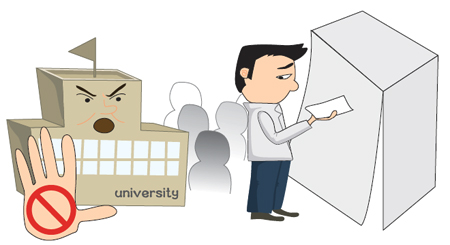Colleges in turmoil over election of presidents
State-run colleges are in a whirlwind of internal conflict over the government’s move to scrap the direct election system that chooses the institution’s presidents.
Changing the way presidents are picked at state schools is the centerpiece of Education Minister Lee Ju-ho’s college restructuring plan. Professors are resisting the move, alleging that it will endanger academic autonomy.
The ministry sees the direct election system as hampering the development of colleges and factionalizing faculties.
Under the system, introduced in 1991, state schools elect presidents through direct voting from professors and school staff. However, there have been reports of bribery scandals involving candidates and factional fighting before elections.
The ministry says it wants to enhance transparency in school administrations and root out corruption by scrapping the direct election system. However, critics are concerned that it might increase government intervention in school affairs. Some professor groups expressed resentment over what they called the ministry’s “radical and biased” school policy. The ministry has already cut state subsidies to some schools.
One of the schools mired in dispute is Kyungpook National University (KNU).
KNU recently changed school regulations to accept the government’s demands despite protests from the professors’ council. Under the revised rules, the school would set up an evaluation committee to choose a president from a selection of candidates. To implement the new rules, the school needs the consent of the majority of professors.
“If we don’t discard the direct election system by August, there could be forceful restructuring by the government,” said Kim Kyu-won, a KNU official. “It would also be impossible for us to receive state subsidies.”
Last year, the ministry picked five “non-viable” state universities that would face rigorous restructuring and financial restrictions. The measure came after it decided not to give subsidies to 43 private colleges. The blacklisted schools claimed that the methods and standards the government adopted to rate schools were biased, but the ministry dismissed these allegations, vowing to press ahead with the restructuring.
The ministry plans to choose more noncompetitive state-run and private schools this year.
Professors claim that the government is tightening its grip on universities, using subsidies. The professors’ council at KNU issued a statement last week to oppose the planned abolishment of the direct election system. The council said it will put the measure to a vote this week.
“We proposed the creation of an emergency committee to discuss how to choose president and map out long-term plans for the school’s future, but the school authorities as well as the education ministry have showed lukewarm attitude,” a KNU professor said.
“State-run schools are not profit-oriented and each school has its own function. However, the government is ignoring this fact.”
Last year, the education ministry vetoed Pusan National University’s plan to appoint a professor as its new president. The professor, surnamed Chung, was elected to the post in June last year in a direct vote by faculty members, but was later convicted of an Election Law violation and fined 4 million won.
Even if the KNU professors elect their own president, he or she is unlikely to get the ministry’s approval.
Tightening grip on schools
According to the ministry, a total of 32 of 38 state universities nationwide have decided to discard the direct election system and, instead, set up their own evaluation committee to choose a president.
The ministry also plans to shut down poorly-managed universities and kick out corrupt managers.
Minister Lee has said the government’s ongoing college restructuring is temporary, but a part of the long-term strategy aimed at enhancing the overall competitiveness of local universities.
“There is misunderstanding among some people that our reform plan will be short-lived. But this is not the case,” Lee said during a recent meeting with the presidents of 38 state universities.
It also announced a plan to introduce a merit-based wage system for professors at state colleges. They denounced it for introducing competition-oriented programs for state schools, ignoring the unique roles they have played in the country’s education.
“The government has often been criticized for lax oversight of state-run schools. We are paying attention to the calls that the government’s reform should begin with efforts to improve the efficiency of state-run colleges and strengthen monitoring of their operations before reforming the private sector,” a ministry spokesman said.
“One of the administration’s key policy goals is to enhance the overall competitiveness of the country’s education to meet the needs of parents and students. That’s why we are concentrating on restructuring state colleges.”
The official dismissed allegations that the ministry is coercing schools into abolishing the election system for presidents, saying they have done so “voluntarily.”
There are speculations that the ministry’s next target will be regional education chiefs.
Some ministry officials have called for a revision of laws to abolish elections for regional education chiefs and make the president or education minister appoint them.
“The regional chiefs have authority over the employment of some 400,000 teaching staff nationwide and an annual education budget of more than 40 trillion won. However, most voters are not interested in the elections,” another ministry official said. “As most candidates are chosen by political parties, voters tend to prioritize their party affiliation when casting ballots.” <The Korea Times/Na Jeong-ju>





